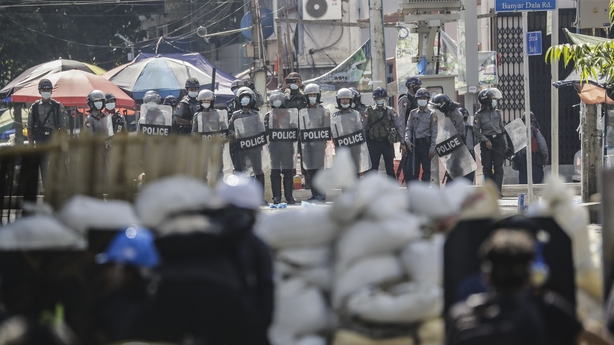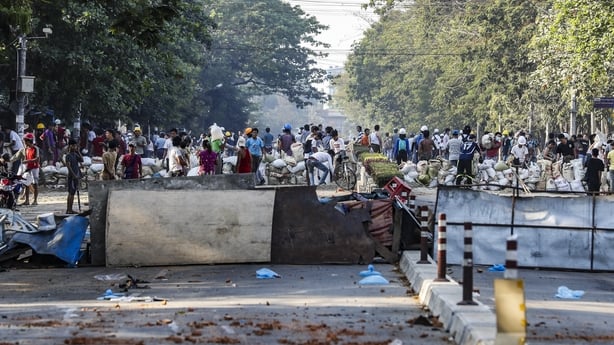UN chief Antonio Guterres has called for the safe release of hundreds of Myanmar protesters "barricaded" inside apartment complexes in Yangon, where security forces are violently cracking down on anti-junta demonstrations, his spokesman said.
The secretary-general "calls for maximum restraint and urges for the safe release of all without violence or arrests," spokesman Stephane Dujarric said.
"Many of those trapped are women who were peacefully marching in commemoration of International Women's Day," he said.
According to the UN rights office "police began shooting and making arrests" in Yangon around 10pm local time, although it was unclear if they were arresting trapped protesters or newly arrived demonstrators.
Myanmar has been in turmoil since a 1 February coup ousted civilian leader Aung San Suu Kyi and triggered mass protests against the new military junta.
The police and military have responded with an increasingly brutal crackdown on demonstrators, with more than 50 people killed and nearly 1,800 arrested.
"We call on all to respect the rights of freedom of assembly and expression of the people of Myanmar as they demonstrate peacefully and express their hopes and desires for the future of their country," Mr Dujarric said.
He also reported that the secretary-general had received a letter from a "special envoy" to the UN appointed by a committee representing Myanmar's parliament, which was forced underground following the coup.
"As far as I know we've not had any contact," with the individual, Mr Dujarric said. "But we'll continue calling people who may have contact with him."
The envoy, who goes only by the name Dr Sasa, asked Mr Guterres in the letter, which was obtained by AFP, to call on the Security Council "to help protect the people of Myanmar from further human rights violations."
He also asked for "robust, targeted sanctions - not only on military leaders but on military enterprises and assets."
The missive, dated 4 March 4, called for "a total arms embargo against the military, to ensure that more weapons do not get into areas already suffering military offensives."
Mr Dujarric said that UN officials, including its special envoy on Myanmar, Christine Schraner Burgener, "have been in contact with elected parliamentarians as part of ongoing contacts with key stakeholders."
"We are deeply concerned about the fate of some 200 peaceful protesters, incl women, who have been cordoned by security forces in Yangon, and may be at risk of arrest or ill-treatment," the UN rights office said in a tweet.
"We urge the police to immediately allow them to leave safely and without reprisals."
The statement came after three protesters were shot dead on Monday.
In the northern city of Myitkyina, security forces used tear gas and opened fire during street clashes with stone-throwing protesters.
There was grisly footage of people lying on beds as health workers frantically tried to resuscitate them.
A poignant image in local media showed a Catholic nun in a white habit on her knees in the street, pleading with police to show restraint.
"Two men were shot dead on the spot, meanwhile three others including a woman were shot in the arm," a medic told AFP.
A third protester was shot dead in the town of Pyapon in the Irrawaddy Delta region, an eyewitness and a rescue official told AFP.

General strike call
It was also a dark day for independent media in the country, as security forces raided the office of Myanmar Now in Yangon.
The outlet later had its publishing licence revoked, as did independent media Mizzima, DVB, Khit Thit and 7 Day, following an information ministry order, state broadcaster MRTV said.
That followed the closure of banks, stores, shopping malls and some clothing factories after an appeal by trade unions for a general strike to bring the economy to a standstill.
"To continue economic and business activities as usual... will only benefit the military as they repress the energy of the Myanmar people," 18 unions said in a statement.
"The time to take action in defence of our democracy is now."
Unions are seeking to ramp up an ongoing "Civil Disobedience Movement" - a campaign urging civil servants to boycott working under military rule - which has already hit state machinery hard.
The impact has been felt at every level of the national infrastructure, with hospital disruptions, empty ministry offices, and banks unable to operate.
The junta has warned that civil servants "will be fired" with immediate effect Monday if they continue to strike.
Physicians for Human Rights said it was appalled by security forces occupying public hospitals, calling the move a violation of international law.
"Even though medical personnel vacated their government posts to initiate the civil disobedience movement, many returned to government hospitals in response to escalating violence against peaceful protestors," the group said.
State-run media confirmed the hospital takeovers.

International pleas
The coup and subsequent crackdown have drawn widespread international condemnation as well as sanctions against key military personnel.
Myanmar's ambassador to Britain, Kyaw Zwar Minn, has said Aung San Suu Kyi and ousted President Win Myint should be released.
In a statement issued after speaking to the UK's foreign minister Dominic Raab, and junior foreign minister Nigel Adams, Kyaw Swar Minn said the answer to the crisis was diplomacy.
"We request the release of State Counsellor Daw Aung San SuuKyi and President U Win Myint," he said in a statement published on the embassy's Facebook page.
Australia's Foreign Minister Marise Payne announced late yesterday that the country was suspending its defence cooperation programme with Myanmar, which included English language training.
Canberra is reviewing its aid programme so money is channelled away from government agencies towards not-for-profit organisations.
The military, which denies responsibility for loss of life in the protests, has defended seizing power by alleging widespread electoral fraud in November's elections, which Suu Kyi's party had won in a landslide.
The Nobel laureate has not been publicly seen since she was detained as the lightning coup was launched in the early hours of 1 February.
Additional reporting by Reuters
